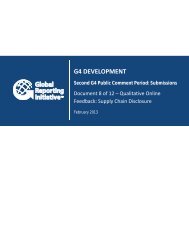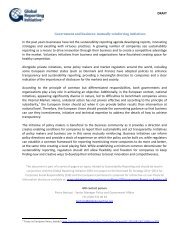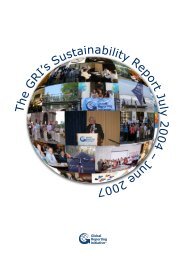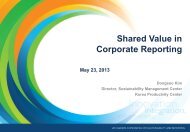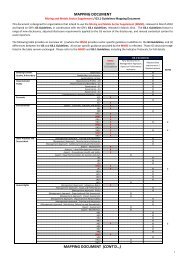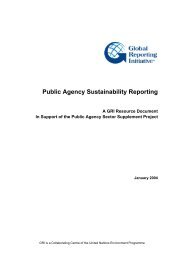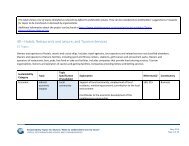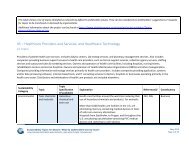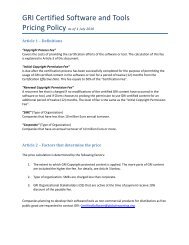Indicator Protocols Set Environment (EN) - Global Reporting Initiative
Indicator Protocols Set Environment (EN) - Global Reporting Initiative
Indicator Protocols Set Environment (EN) - Global Reporting Initiative
You also want an ePaper? Increase the reach of your titles
YUMPU automatically turns print PDFs into web optimized ePapers that Google loves.
eN28 Monetary value of significant<br />
fines and total number of non-monetary<br />
sanctions for non-compliance with<br />
environmental laws and regulations.<br />
1. relevance<br />
The level of non-compliance within the organization<br />
helps indicate the ability of management to ensure<br />
that operations conform to certain performance<br />
parameters. From an economic perspective, ensuring<br />
compliance helps to reduce financial risks that occur<br />
either directly through fines or indirectly through<br />
impacts on reputation. In some circumstances, noncompliance<br />
can lead to clean-up obligations or other<br />
costly environmental liabilities. The strength of the<br />
organization’s compliance record can also affect its<br />
ability to expand operations or gain permits.<br />
2. Compilation<br />
2.1 Identify administrative or judicial sanctions for<br />
failure to comply with environmental laws and<br />
regulations, including:<br />
• International declarations/conventions/<br />
treaties, and national, sub-national, regional,<br />
and local regulations. Include non-compliances<br />
related to spills as disclosed under <strong>EN</strong>23 that<br />
meet the criteria for <strong>EN</strong>28;<br />
• Voluntary environmental agreements with<br />
regulating authorities that are considered<br />
binding and developed as a substitute for<br />
implementing new regulations. In certain<br />
jurisdictions, such agreements are referred to<br />
as ‘covenants’; and<br />
• Cases brought against the organization<br />
through the use of international dispute<br />
mechanisms or national dispute mechanisms<br />
supervised by government authorities.<br />
2.2 Report significant fines and non-monetary<br />
sanctions in terms of:<br />
• Total monetary value of significant fines;<br />
• Number of non-monetary sanctions; and<br />
• Cases brought through dispute resolution<br />
mechanisms.<br />
<strong>Indicator</strong> <strong>Protocols</strong> <strong>Set</strong>: <strong>EN</strong> IP<br />
2.3 Where reporting organizations have not identified<br />
any non-compliance with laws or regulations, a<br />
brief statement to this fact is sufficient.<br />
3. definitions<br />
environmental laws and regulations<br />
Refers to regulations related to all types of<br />
environmental issues (i.e., emissions, effluents, and<br />
waste, as well as material use, energy, water, and<br />
biodiversity) applicable to the reporting organization.<br />
This includes binding voluntary agreements that are<br />
made with regulatory authorities and developed<br />
as a substitute for implementing a new regulation.<br />
Voluntary agreements can be applicable if the<br />
reporting organization directly joins the agreement or<br />
if public agencies make the agreement applicable to<br />
organizations in their territory through legislation or<br />
regulation.<br />
4. documentation<br />
Data sources include audit results or regulatory tracking<br />
systems operated by the legal department. Information<br />
regarding monetary fines can be found in accounting<br />
departments.<br />
5. references<br />
None.<br />
Version 3.1<br />
35





